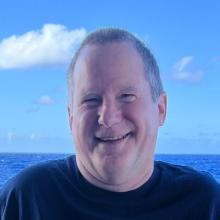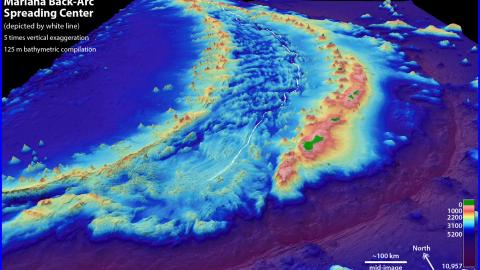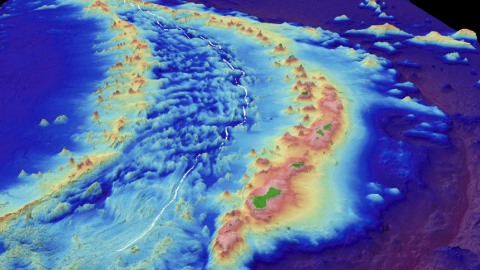
Bill Chadwick
Tell us about your work/research. What kinds of things do you do?
I mainly study active submarine volcanoes (but also occasionally volcanoes on land). I've worked all around the world, but especially in the northeast and western Pacific Ocean. My research interests include the interactions between deep-sea volcanic activity, hydrothermal venting, and the unique biological communities that they host. I use high-resolution mapping with sonars and visual observations from ROVs to map the geology of the seafloor and interpret how lava is emplaced during submarine eruptions. I'm particularly interested in detecting changes caused by eruptions because it tells us about the frequency and character of volcanic activity that we would otherwise not know about. The Mariana region is chock full of fascinating and dynamic submarine volcanoes, so I'm really looking forward to this expedition!
What sparked your initial interest in your career?
I started studying geology in college and loved the field trips that opened my eyes to understanding the landscapes around me. Then Mount St. Helens erupted between my junior and senior years, and that really caught my attention. My senior year, I managed to arrange to volunteer with the US Geological Survey at Mount St. Helens over my Christmas break when they were short-handed, and before I knew it I was flying in a helicopter into the crater as a field assistant. The first dome-building eruption happened while I was there, and that whole experience was incredibly exciting, and I was immediately hooked on studying active volcanoes, trying to figure out how they worked, and trying to forecast their activity.
Who influenced you or encouraged you the most?
The professor who talk my Intro to Geology class at Colorado College (John Lewis) really made it interesting, challenging, and fun, and he made me want to learn more.
What element of your work/study do you think is the most fascinating?
Some of the most exciting ROV dives in my career have been at submarine volcanoes in the Mariana region, where we've encountered everything from active eruptions, vents emitting liquid CO2 droplets, and pools of molten sulfur on the seafloor!
How did you get involved with the Ocean Exploration Trust?
Having worked in the Mariana region before, I gave lots of input to OET in their planning process for this cruise, and to my surprise they invited me to be Lead Scientist on the cruise!
What other jobs led you to your current career?
After my short volunteer stint at Mount St. Helens in college, and returned there after I graduated and worked for the several years there with the USGS. Then I went to graduate school at UCSB and did a PhD working with data that I helped collect at Mount St. Helens. After grad school, I had a post-doc with the USGS in Menlo Park studying Galapagos volcanoes. Then after that I took a job at Oregon State University working with a NOAA research program on submarine volcanism and hydrothermal vents. It turned out to be a great niche, applying what I had learned about volcanoes on land to submarine volcanoes in the ocean, which are much less understood. And amazingly I've been doing that for over 35 years!
What are your degreed and certifications?
Bachelor of Arts in Geology - Colorado College 1981; PhD in Geology - University of California at Santa Barbara 1988
What are your hobbies?
I love hiking, biking, skiing, and traveling (and if there's a volcano nearby, all the better!)
What advice would you give someone who wants to have a career like yours?
Pay attention to what you find interesting and exciting and want to know more about. Your curiosity and joy are your fuel! Beyond the classroom, look for opportunities to volunteer and try to get into the field or into the lab to get experience and figure out what you like and don't like doing. Use that information to refine your direction. Find people who are doing what you might want to do, and see if you can get involved. Seek experiences that will help you decide and could lead to other things. You don't have to know what you want to do for the rest of your life, you only need to decide what you want to do NEXT.
Expeditions
Bill participated in the following Ocean Exploration Trust expeditions:



